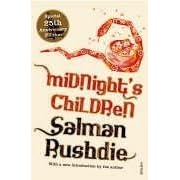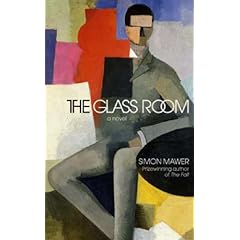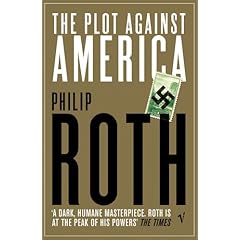 The winner of the Booker Prize in 1981, the Booker of Bookers in 1993, and the Best of the Booker in 2008, this book is much-acclaimed and highly recommended. The New York Times claims:
The winner of the Booker Prize in 1981, the Booker of Bookers in 1993, and the Best of the Booker in 2008, this book is much-acclaimed and highly recommended. The New York Times claims:
The literary map of India has to be redrawn... Midnight's Children sounds like a continent finding its voice.
And, I can't even refute that for argument's sake, because this epic novel explores the history of Indian independence, of the Indo-China war, the Emergency, blackouts, the Partition, the emergence of Bangladesh, and essentially, it's a history of the Indian sub-continent from the time of its birth. But, what makes this novel truly historical is its protagonist: Saleem Sinai, born exactly at the stroke of the midnight hour, when the world slept and, India awoke to life and freedom, and the other 'midnight children' - children born between midnight and 1 am on the day of India's independence. One thousand and one of them. These children are all special, gifted. While one can travel through time, another can travel via any reflective surface. There's a witch, and there's a girl so beautiful that her beauty blinds anyone who sees her face. Someone else can changes sexes at will. But, of course, the most potent of gifts comes to Saleem, born exactly at midnight - the gift of telepathy, as well as, being able to 'conference' in all the midnight's children, and allowing them to communicate through him. And his nemesis, Shiva, who ironically enough, is born in the same hospital at exactly the same time. While Saleem was the offspring of a Hindu street-singer, Shiva was born into a affluent Kashmiri family. However, typically, a nurse made the switch, thereby changing the destiny of the two most potent Midnight Children, who would be mortal enemies until the end. While Saleem's birth was celebrated, with a letter from the then Prime Minister, saying his life would always be entwined with his country's, Shiva's birth was not celebrated nation-wide!
So, who were the Midnight's Children? What did they signify?
Reality can have metaphorical content; that does not make it less real. A thousand and one children were born; there were a thousand and one possibilities which had never been present in one place at one time before; and there were a thousand and one dead ends. Midnight's children can be made to represent many things, according to your point of view; they can be seen as the last throw of everything antiquated and retrogressive in our myth-ridden nation, whose defeat was entirely desirable in the context of a modernizing, twentieth-century economy; or as the true hope of freedom, which is now forever extinguished; but what they must not become is the bizarre creation of a rambling diseased mind. No: Illness is neither here nor there.
However, this book does not trace the life of all one thousand and one children, or the five hundred and eighty one that survived. In fact it focuses solely on Saleem, the narrator, and the thirty-one years of his life. And the life of his parents and grandparents. An astrologer predicted Saleem's fortunes (or, shall we say misfortunes, for he was both, the master and the victim of his time) before his birth:
A son... such a son! A son, who will never be older than his motherland - neither older nor younger. ... There will be two heads - but you shall only see one - there will be knees and a nose, a nose and knees. Newspaper praises him, two mothers raise him! Bicyclists love him - but crowds will shove him. Sisters will weep; cobra will creep... Washing will hide him - voices will guide him! Friends mutilate him - blood will betray him! Spittoons will brain him - doctors will drain him - jungle will claim him - wizards reclaim him! Soldiers will try him, tyrants will fry him... He will have sons without having sons. He will be old before he is old! And he will die before he is dead!
Sounds complicated, right? The above pretty much sums up the story. If you think it's confusing, it's because it is. A tryst with destiny, a dance with fate and he seems singly responsible for a multitude of historical events in India, post-independence: be it the emergence of Gujarat and Maharashtra, or the Indo-Pak wars, the politics, or even the Emergency period!
You would think that the Midnight's Children would unite, to do some good, to do their nation proud. But, India at the time, seemed to be in a chaotic state of class differences, where people of the various castes did not interact with one another. And, there was a bigger problem: Saleem was their only mode of communication, and once he discovered how he and Shive had swapped destinies, he was reluctant to open the Midnight's Children network again, lest his arch-enemy discovered how his affluent birth had been denied. So, the children lived in denial, hiding their gifts, not interacting with one another, and thereby letting the nation succumb to an apparent greater evil, which would be the end of the Children.
Yes, it's a complex plot, and it's a difficult read. Rushdie's writing is convoluted, and he has literally created his own language and grammar rules. From not using commas, to using words like 'nearlynine' and 'almosteight'. Towards the latter half of the book, there are chunks where in the same paragraph, he refers to himself in both, first and third, person, making the book more difficult to read than it should be. But then again, with my past experiences with Rushdie, this isn't altogether surprising.
The book's interesting, gripping, and colorful. It shows you a historical India, tainted with its new-found independence, and corruption. It gives you an insight into the culture of the country, and the lifestyle. The fascination with Europeans and Americans, and the emphasis on 'black' being unattractive.
However, what I really loved about the book was the role of Padma - a role so effortlessly and artistically worked in, that it actually helped me through the first couple of hundred pages. So, who is she? Padma is physically present as Saleem is writing his story. Through the book, we are allowed a glimpse into the psyche and emotions of Saleem, as he narrates his story, battling his past, and simultaneously attempting to adhere to the truth as much as possible. However, Saleem is prone to digressing, and often, initially, I found that I wasn't quite sure where the book was going. And, that's where Padma steps in: she calls him on it.
But here is Padma at my elbow, bullying me back into the world of linear narrative, the universe of what happened next: 'At this rate,' Padma complains, 'you'll be two hundred years old before you manage to tell about your birth.'
or,
You better get a move on or you'll die before you get yourself born.
Honestly, at the time I was reading this portion, I was hoping the narrator would bring his meanderings to a close, and move on with the story. What's amazing is, this allows both: digressions, and a gentle push back into the story line.
This is an amazing work of literature, and I fully think it deserves to win both, the Booker of Bookers and the Best of the Booker. Volume, story, historical value and literary significance - all in abundance.
Overall rating: 9/10.
 I finished this book over two weeks ago, and have been struggling to write the review ever since. I honestly hoped I wouldn't have to drag it into the new year, but there you have it...
This is the first Toni Morrison I've read, and I started the book with great trepidation. I've heard phenomenal things about Toni Morrison, and I was intimidated... unsure of what to expect. I really hoped I'd enjoy the book, and it would make me go out and buy more books by Morrison instantaneously, but unfortunately, I was left feeling fairly indifferent. I didn't like the book. I didn't dislike the book... and I'm not accustomed to having that kind of a reaction to a book - especially as I've mulled over it for about two weeks!
I finished this book over two weeks ago, and have been struggling to write the review ever since. I honestly hoped I wouldn't have to drag it into the new year, but there you have it...
This is the first Toni Morrison I've read, and I started the book with great trepidation. I've heard phenomenal things about Toni Morrison, and I was intimidated... unsure of what to expect. I really hoped I'd enjoy the book, and it would make me go out and buy more books by Morrison instantaneously, but unfortunately, I was left feeling fairly indifferent. I didn't like the book. I didn't dislike the book... and I'm not accustomed to having that kind of a reaction to a book - especially as I've mulled over it for about two weeks!



 This incredibly poignant well written story tackles various important and sensitive topics, some of which are still valid today, despite the book being set around the time of the second World War.
This incredibly poignant well written story tackles various important and sensitive topics, some of which are still valid today, despite the book being set around the time of the second World War. Amy Tan's debut novel, The Joy Luck Club, is the first book by her that I have read. It is also the first book I've read with strong Chinese references, so I wasn't quite sure as to what I should expect from this book.
The Joy Luck Club is the story of four Chinese women who have immigrated to the United States of America, under different circumstances, and all four are attempting to bring up their daughters in America - daughters who think like Americans, despite their mothers best efforts to instil in them their Chinese culture and heritage.
Amy Tan's debut novel, The Joy Luck Club, is the first book by her that I have read. It is also the first book I've read with strong Chinese references, so I wasn't quite sure as to what I should expect from this book.
The Joy Luck Club is the story of four Chinese women who have immigrated to the United States of America, under different circumstances, and all four are attempting to bring up their daughters in America - daughters who think like Americans, despite their mothers best efforts to instil in them their Chinese culture and heritage. The year is 1946, Israel doesn't exist yet, and Tel Aviv is part of Palestine. World War II has just ended, but, its aftermath continues, as the global map is changing. and colonialism is coming to an end.
Evelyn Sert, a twenty year old hairdresser from Soho (London), sails to Palestine to be part of the Zionist movement, as Israel is born. Her mother has just died after a series of strokes, and her mother's lover, Uncle Joe, arranges for her to leave London, with ample money, and the dream of being part of a historical movement for all Jews.
The year is 1946, Israel doesn't exist yet, and Tel Aviv is part of Palestine. World War II has just ended, but, its aftermath continues, as the global map is changing. and colonialism is coming to an end.
Evelyn Sert, a twenty year old hairdresser from Soho (London), sails to Palestine to be part of the Zionist movement, as Israel is born. Her mother has just died after a series of strokes, and her mother's lover, Uncle Joe, arranges for her to leave London, with ample money, and the dream of being part of a historical movement for all Jews. Have you ever read a book, which fills you with guilt, because you haven't really enjoyed it? For me, this book is Lloyd Jones' The Book of Fame. I almost feel guilty about picking it up, because, when the book was being written, the author didn't have a reader like me in mind.
This is the second book I've read this year written in a collective first person (the first being
Have you ever read a book, which fills you with guilt, because you haven't really enjoyed it? For me, this book is Lloyd Jones' The Book of Fame. I almost feel guilty about picking it up, because, when the book was being written, the author didn't have a reader like me in mind.
This is the second book I've read this year written in a collective first person (the first being  The winner of the Booker Prize in 1981, the Booker of Bookers in 1993, and the Best of the Booker in 2008, this book is much-acclaimed and highly recommended. The
The winner of the Booker Prize in 1981, the Booker of Bookers in 1993, and the Best of the Booker in 2008, this book is much-acclaimed and highly recommended. The  This review has been outstanding for about a month and a half, and for that I apologize. I read it back when I was working towards a big deadline, and I just didn't find time to review it back then. But here it is, now...
This review has been outstanding for about a month and a half, and for that I apologize. I read it back when I was working towards a big deadline, and I just didn't find time to review it back then. But here it is, now...